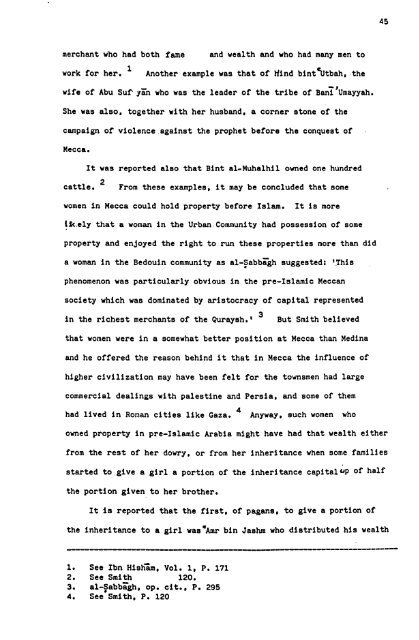Download - University of Salford Institutional Repository
Download - University of Salford Institutional Repository
Download - University of Salford Institutional Repository
You also want an ePaper? Increase the reach of your titles
YUMPU automatically turns print PDFs into web optimized ePapers that Google loves.
merchant who had both f ame and wealth and who had many men to<br />
work for her.<br />
1<br />
Another example was that <strong>of</strong> Hind bintcUtbah, the<br />
wife <strong>of</strong> Abu Suf- yMi who was the leader <strong>of</strong> the tribe <strong>of</strong> Barýi"'Umayyah.<br />
She was also. together with her husband, a corner stone <strong>of</strong> the<br />
campaign <strong>of</strong> violence. against the prophet before the conquest <strong>of</strong><br />
Mecca.<br />
cattle.<br />
It was reported also that Bint al-Muhalhil owned one hundred<br />
2<br />
From these examples. it may be concluded that some<br />
women in Mecca could hold property before Islam. It is more<br />
M. ely that a woman in the Urban. Community had possession <strong>of</strong> some<br />
property and enjoyed the right to run these properties more than did<br />
a woman in the Bedouin community as al-Sabbi'gh suggested: 'This<br />
phenomenon was particularly obvious in the pre-Islamic Meccan<br />
society which was dominated by aristocracy <strong>of</strong> capital represented<br />
in the richest merchants <strong>of</strong> the Quraysh. ' 3<br />
But Smith believed<br />
that women were in a somewhat better position at Mecca than Medina<br />
and he <strong>of</strong>fered the reason behind it that in Mecca the influence <strong>of</strong><br />
higher civilization may have been felt for the townsmen had large<br />
commercial dealings with palestine and Persia, and some <strong>of</strong> them<br />
had lived in Ronan cities like Gaza. 4 Anyway. such women who<br />
owned property in pre-Islamic Arabia might have had that wealth either<br />
from the rest <strong>of</strong> her dowry. or from her inheritance when some families<br />
started to give a girl a portion <strong>of</strong> the inheritance capitalýP <strong>of</strong> half<br />
the portion given to her brother.<br />
It is reported that the first. <strong>of</strong> pagans. to give a portion'<strong>of</strong><br />
the inheritance to a girl was C Amr bin Jashm who distributed his wealth<br />
1. See Ibn Histram, Vol. 1, P. 171<br />
2. See Smith 120.<br />
3. al-Sabbagh. op. cit.. P. 295<br />
0<br />
4. See Smith. P. 120<br />
45
















